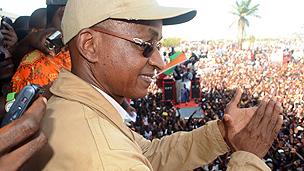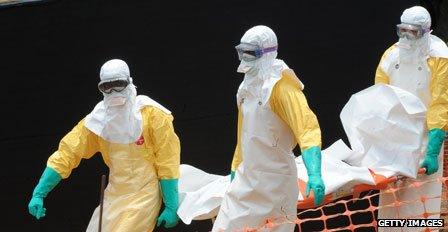Guinea profile - Timeline
- Published
A chronology of key events:
1891 - France declaress Guinea to be a colony, separate from Senegal.
1898 - Defeat of resistance to French occupation led by Samory Toure, great-grandfather of future President Ahmed Sekou Toure.
1906 - Guinea becomes part of French West African Federation.
1952 - Ahmed Sekou Toure becomes secretary-general of the Democratic Party of Guinea.
Independence
1958 October - Guinea becomes independent, with Ahmed Sekou Toure as president.
1965 - Sekou Toure breaks off relations with France after accusing it of plotting to oust him.
1984 March - Sekou Toure dies.
1984 April - Lansana Conte and Diarra Traore seize power in bloodless coup. Conte becomes president while Traore is installed as prime minister.
1985 - Attempted coup organized by Traore following his demotion to education minister.
1990 - Constitution paving the way for civilian government is adopted.
Democracy without peace
1993 - First multiparty elections are held; Conte confirmed in office.
1995 - Conte's Party of Unity and Progress wins 71 of the National Assembly's 114 seats.
1996 - Some 30 people are killed and presidential palace set on fire as 25% of Guinea's armed forces mutiny over low pay, poor conditions.
2000 September - Alpha Conde, leader of opposition Guinean People's Rally, sentenced to five years in prison for endangering state security and recruiting foreign mercenaries. He is pardoned in May 2001.
2000 September - Start of incursions by rebels in Guinea's border regions with Liberia and Sierra Leone which eventually claim more than 1,000 lives and cause massive population displacement. The government accuses Liberia, the Sierra Leonean United Revolutionary Front (RUF) rebel group, Burkina Faso and former Guinean army mutineers of trying to destabilise Guinea.
2001 February - Government deploys attack helicopters to the front-line in its fight with rebels.
Referendum
2001 November - Official results show constitutional referendum, boycotted by opposition, endorses President Conte's proposal to extend presidential term from five to seven years. Critics accuse Mr Conte of trying to stay in power for life.
2002 March - Guinea, Sierra Leone, Liberia agree on measures to secure mutual borders and to tackle insurgency.
2003 November - Opposition leader Jean-Marie Dore detained, subsequently released, after saying President Conte is too ill to contest December's presidential election.
2003 December - President Conte wins a third term in elections boycotted by the opposition.
2004 April - Prime Minister Lounseny Fall resigns while visiting the US.
2005 January - President Conte survives what security officials say is an assassination attempt. Shots were fired as his motorcade passed through the capital.
2005 July - Alpha Conde, head of the main opposition Guinean People's Rally, returns from exile in France. He is welcomed by thousands of supporters.
2006 March - President Conte is flown to Switzerland for medical treatment. Opposition parties call for the formation of an interim government.
2006 April - Prime Minister Cellou Dalein Diallo sacked.
Strikes and protests
2006 June - Crippling general strike suspended after eight days after trade unions, government agree on wages and prices of basic goods. Several student protesters were killed during unrest over the postponement of exams due to the strike.
2006 October - President Conte fails to make his usual independence day speech, fuelling concerns about his health.
2007 January - General strike called by unions, opposition in protest against the rule of President Conte. Several people are killed in clashes between demonstrators and police.
2007 13 February - President Conte declares a state of emergency, instructs the army to restore order following days of violent protests.
2007 26 February - President names Lansana Kouyate as prime minister under a deal to end the general strike.
2007 May - Violent protests as soldiers demand better pay.
2007 August - Government announces discovery of commercially viable reserves of uranium.
2008 May - President sacks Lansana Kouyate as prime minister and replaces him with former minister of mines and ally Ahmed Tidiane Souare.
Soldiers begin a mutiny over pay.
Conte dies, military seizes power
2008 December - President Lansana Conte dies. Military seizes power. The coup meets with international condemnation, but many Guineans back the army's move.
Captain Moussa Dadis Camara emerges as leader of the new military junta and declares himself president.
Junta appoints former banker Kabine Komara as prime minister.
2009 August - Military leader Captain Moussa Dadis Camara says presidential elections will be held on 31 January 2010 and elections for parliament in March. Despite a previous promise that he would not seek election, his supporters form a movement urging him to stand.
2009 September - Soldiers open fire on a mass opposition rally at a stadium in Conakry, called to urge military ruler Moussa Camara to step down. The Guinean Human Rights Organisation says 157 are killed in the violence and over 1200 injured. The military government puts the death toll at 57, and bans all "subversive" gatherings.
2009 October - The European Union, the African Union and the US United States impose sanctions.
The United Nations sets up a tribunal to probe the death of at least 150 protesters, who died when troops fired on an anti-government demonstration in September.
2009 December - Captain Camara is shot in the head by a former aide.
Junta leader shot
2010 January - After receiving treatment in Morocco, Captain Camara goes to Burkina Faso to recuperate. Capt Camara agrees to stay abroad and leave his deputy Gen Sekouba Konate in charge.
Pro-democracy opposition leader and civilian Jean-Marie Dore is appointed interim PM to head a power-sharing government and oversee a return to civilian rule.
2010 February - International Criminal Court (ICC) says September stadium massacre was a crime against humanity.
2010 May - Campaigning kicks off for 27 June presidential election. Military junta promises to respect result.
2010 June - Presidential elections. First round produces no outright winner.
2010 October - Clashes ahead of run-off presidential elections.
Conde elected
2010 November - Alpha Conde declared winner of run-off presidential race. Emergency declared after clashes between security forces and supporters of defeated candidate Cellou Dalein Diallo.
2011 February - President Alpha Conde says the military junta in power before he took over left Guinea bankrupt.
2011 July - Gunmen attack and partly destroy the residence of President Alpha Conde, who escapes injury. Hours later, the security forces arrest former army chief Gen Nouhou Thiam.
2011 September - Police arrest hundreds of opposition activists protesting against what they say are attempts by President Conde to rig parliamentary elections in December. These are later postponed.
2011 December - President Conde promises a review of mining contracts.
2012 April - President Conde delays 8 July parliamentary elections, originally scheduled for late 2011. Opposition welcomes the move.

Opposition leader Cellou Dalein Diallo meets supporters in the run-up to May 2013 polls
2012 May - Security forces clash with protesters angered by the government's handling of forthcoming parliamentary polls.
2012 November - Head of the treasury Aissatou Boiro - who fought against corruption - is shot dead.
2012 December - Electoral commission sets date for parliamentary elections at 12 May 2013.
2013 February - Armed forces chief General Kelefa Diallo - tasked with reforming the military - is killed in an air crash in Liberia.
2013 March - One person killed in clashes between police and opposition supporters demanding transparency in elections planned for May.

An Ebola virus epidemic spread from Guinea to neighbouring countries, killing hundreds within months
2013 May - Parliamentary elections delayed again.
2013 September - President Conde's Rally of the Guinean People comes out ahead in long overdue parliamentary elections. International observers note irregularities and opposition parties allege fraud, but the result is upheld by the Supreme Court.
2014 February - Outbreak of the deadly Ebola virus in southern Guinea. It spreads to neighbouring Sierra Leone and Liberia, killing more than 600 by mid-July.
2014 August - The World Health Organisation says the spread of Ebola in west Africa is an international public health emergency, and calls for a coordinated response.
2014 September - President Obama announces that 3,000 US military personnel are being sent to west Africa to build new health facilities and to train health workers, as part of efforts to combat the Ebola epidemic.
The World Bank warns that the Ebola outbreak could have a catastrophic effect on the economies of Guinea, Liberia and Sierra Leone.
2015 February - After brief respite in January, Guinea, along with Sierra Leone and Liberia, reports rise in new cases of Ebola.
2015 April - Mass protests in Conakry over the timetable for presidential and local elections.
2015 October - President Conde wins a second term.
2017 April - Riots disrupt operations at bauxite mines in the north-west where residents complain about power cuts and high levels of pollution.
2017 August - Thousands of opposition supporters march in Conakry to press the president to respect an agreement to organise local elections.
2018 February - First local elections since military rule ended in 2005.
2019 November - At least two people are killed in police crackdown on protests against bid by President Conde to change the constitution and let him run for a third term.